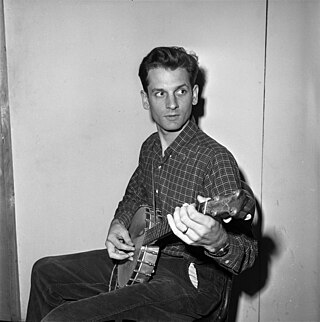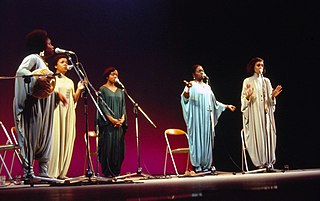Related Research Articles

Newport Folk Festival is an annual American folk-oriented music festival in Newport, Rhode Island, which began in 1959 as a counterpart to the Newport Jazz Festival. It was one of the first modern music festivals in America, and remains a focal point in the expanding genre of folk music. The festival was held annually from 1959 to 1969, except in 1961 and 1962. In 1985, its founder revived it in Newport, where it has been held at Fort Adams State Park ever since.

Hazel Jane Dickens was an American bluegrass singer, songwriter, double bassist and guitarist. Her music was characterized not only by her high, lonesome singing style, but also by her provocative pro-union, feminist songs. Cultural blogger John Pietaro noted that "Dickens didn’t just sing the anthems of labor, she lived them and her place on many a picket line, staring down gunfire and goon squads, embedded her into the cause." The New York Times extolled her as "a clarion-voiced advocate for coal miners and working people and a pioneer among women in bluegrass music." With Alice Gerrard, Dickens was one of the first women to record a bluegrass album.

Mike Seeger was an American folk musician and folklorist. He was a distinctive singer and an accomplished musician who played autoharp, banjo, fiddle, dulcimer, guitar, mouth harp, mandolin, dobro, jaw harp, and pan pipes. Seeger, a half-brother of Pete Seeger, produced more than 30 documentary recordings, and performed in more than 40 other recordings. He desired to make known the caretakers of culture that inspired and taught him.
John Cohen was an American musician, photographer and film maker who performed and documented the traditional music of the rural South and played a major role in the American folk music revival. In the 1950s and 60s, Cohen was a founding member of the New Lost City Ramblers, a New York-based string band. Cohen made several expeditions to Peru to film and record the traditional culture of the Q'ero, an indigenous people. Cohen was also a professor of visual arts at SUNY Purchase College for 25 years.

Toshi Reagon is an American musician of folk, blues, gospel, rock and funk, as well as a composer, curator, and producer.
Alice Gerrard is an American bluegrass singer, banjoist, fiddler, and guitar player. She performed as part of a duo with Hazel Dickens, and as part of The Strange Creek Singers and The Back Creek Buddies.
Smithsonian Folkways is the nonprofit record label of the Smithsonian Institution. It is a part of the Smithsonian's Smithsonian Center for Folklife and Cultural Heritage, located at Capital Gallery in downtown Washington, D.C. The label was founded in 1987 after the family of Moses Asch, founder of Folkways Records, donated the entire Folkways Records label to the Smithsonian. The donation was made on the condition that the Institution continue Asch's policy that each of the more than 2,000 albums of Folkways Records remain in print forever, regardless of sales. Since then, the label has expanded on Asch's vision of documenting the sounds of the world, adding six other record labels to the collection, as well as releasing over 300 new recordings. Some well-known artists have contributed to the Smithsonian Folkways collection, including Pete Seeger, Ella Jenkins, Woody Guthrie, and Lead Belly. Famous songs include "This Land Is Your Land", "Goodnight, Irene", and "Midnight Special". Due to the unique nature of its recordings, which include an extensive collection of traditional American music, children's music, and international music, Smithsonian Folkways has become an important collection to the musical community, especially to ethnomusicologists, who utilize the recordings of "people's music" from all over the world.
Elizabeth Ardis Mitchell is an American singer, songwriter and musician. She began her career performing with Lisa Loeb as the duo Liz and Lisa, then founded the indie rock band Ida in 1991, of which she continues to be a member. As a solo artist, she has been recording and performing music for children since 1998.

Sarah Lee Guthrie and Johnny Irion are a musical duo. Guthrie and Irion were married on October 16, 1999, and began performing together as an acoustic duo in late 2000. Their music combined Irion's love of rock and blues with Guthrie's roots of folk and country.
"Worried Man Blues" is a folk song in the roots music repertoire. It is catalogued as Roud Folk Song Index No. 4753. Like many folk songs passed by oral tradition, the lyrics vary from version to version, but generally all contain the chorus "It takes a worried man to sing a worried song/It takes a worried man to sing a worried song/I'm worried now, but I won't be worried long." The verses tell the story of a man imprisoned for unknown reasons "I went across the river, and I lay down to sleep/When I woke up, had shackles on my feet", who pines for his lost love, who is "on the train and gone." The melody in 4/4 timing has a strong resemblance to "The Battle Hymn of the Republic", which is in 6/8 timing.
Rainbow Quest (1965–66) was a U.S. television series devoted to folk music and hosted by Pete Seeger. It was videotaped in black-and-white and featured musicians playing in traditional American music genres such as traditional folk music, old-time music, bluegrass and blues. The show's title is drawn from the lyrics of the song by Seeger "Oh, Had I A Golden Thread".

The Union Boys was an American folk music group, formed impromptu in 1944, to record several songs on an album called Songs for Victory: Music for Political Action. Its "all-star leftist" members were Josh White, Sonny Terry, Brownie McGhee, Pete Seeger, Burl Ives, Tom Glazer.
"Cumberland Gap" is an Appalachian folk song that likely dates to the latter half of the 19th century and was first recorded in 1924. The song is typically played on banjo or fiddle, and well-known versions of the song include instrumental versions as well as versions with lyrics. A version of the song appeared in the 1934 book, American Ballads and Folk Songs, by folk song collector John Lomax. Woody Guthrie recorded a version of the song at his Folkways sessions in the mid-1940s, and the song saw a resurgence in popularity with the rise of bluegrass and the American folk music revival in the 1950s. In 1957, the British musician Lonnie Donegan had a No. 1 UK hit with a skiffle version of "Cumberland Gap".
Folkways Records was a record label founded by Moses Asch that documented folk, world, and children's music. It was acquired by the Smithsonian Institution in 1987 and is now part of Smithsonian Folkways.
Moses Asch was an American recording engineer and record executive. He founded Asch Records, which then changed its name to Folkways Records when the label transitioned from 78 RPM recordings to LP records. Asch ran the Folkways label from 1948 until his death in 1986. Folkways was very influential in bringing folk music into the American cultural mainstream. Some of America's greatest folk songs were originally recorded for Asch, including "This Land Is Your Land" by Woody Guthrie and "Goodnight Irene" by Lead Belly. Asch sold many commercial recordings to Verve Records; after his death, Asch's archive of ethnic recordings was acquired by the Smithsonian Institution, and released as Smithsonian Folkways Records.

Suni Paz is an Argentinian singer, songwriter, guitarist, poet, folklorist, translator, and teacher, who has recorded and has been published extensively. Paz is part of the progressive Latin American music movement known as nueva canción.

Kaia Kater is a Canadian singer-songwriter, guitar, piano and banjo player.
Jeff Place is the Grammy-award-winning Archivist and Curator at the Smithsonian Center for Folklife and Cultural Heritage. He and Anthony Seeger were the first two full-time employees hired in 1987 when the Smithsonian acquired Folkways Records from the estate of Folkways founder Moses Asch.

Yasmeen Williams is an American gospel singer and former member of the African American a cappella ensemble Sweet Honey In The Rock.
References
- ↑ Carlin, Richard (2008). Worlds of Sound: The Story of Smithsonian Folkways (1st ed.). New York: Smithsonian Books; Collins. ISBN 9780061563553. OCLC 219568100.
- ↑ "Featured Artists". Smithsonian Folkways. n.d. Archived from the original on September 11, 2014. Retrieved June 27, 2022.
- ↑ "Kaia Kater signs to Smithsonian Folkways".